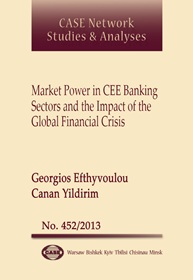Study on “Market power in CEE banking sectors and the impact of the global financial crisis” published
 The global financial crisis has stirred a crucial debate on the possible improvements of the financial regulatory and supervisory framework. Bailing out financial institutions during the crisis, together with proposed regulatory changes, raised concerns over the resulting market structure and the implications for competition in the financial sector. In response to the new market and regulatory conditions, business models have also been changing. Consequently, according to the study’s authors, in order to develop policies promoting stable and efficient financial systems, it is crucial to understand the determinants of market power.
The global financial crisis has stirred a crucial debate on the possible improvements of the financial regulatory and supervisory framework. Bailing out financial institutions during the crisis, together with proposed regulatory changes, raised concerns over the resulting market structure and the implications for competition in the financial sector. In response to the new market and regulatory conditions, business models have also been changing. Consequently, according to the study’s authors, in order to develop policies promoting stable and efficient financial systems, it is crucial to understand the determinants of market power.
In their study, entitled “Market power in CEE banking sectors and the impact of the global financial crisis”, Canan Yildirim and Georgios Efthyvoulou try to assess the market power in Central and Eastern Europe (CEE) banking markets and identify the factors that explain its level and variation over time. The authors assess how the global crisis has affected market power and what the impact of foreign ownership has been. The main results of their study show that market power differs across banks with different ownership characteristics, with foreign-owned banks from the EU and United States having higher margins compared to privately-owned domestic banks. Additionally, the effects of asset quality and capitalization on margins are different in the pre-crisis and crisis years. While in the pre-crisis period the impacts are similar for all banks regardless of their ownership, during the crisis period foreign ownership is found to eliminate the negative impact of non-performing loans on margins.
Read the full paper here.
